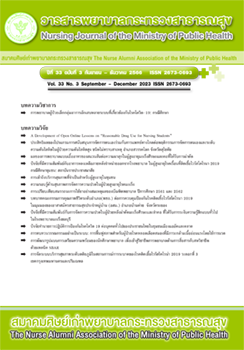A Development of Open Online Lessons on “Reasonable Drug Use for Nursing Students”
Main Article Content
Abstract
The aim of this study was to develop and evaluate the effectiveness of an online learning program called “rational use of drugs for nursing students”. The sample consisted of 155 third-year nursing students from the Faculty of Nursing at Burapha University. This study was conducted from February 2022 to April 2023. The research instruments were two assessment forms to evaluate the quality of online teaching and satisfaction with the use online lessons. The data were analyzed using descriptive statistics. The results showed that 1) the online courses define learning units RDU, RDU to case study, case study and knowledge integration RDU with 10 hours of the learning time. Students must have a total score of at least 60% to be considered qualified. 2) Overall quality and factors related to the quality of online courses were ranked at the highest level (M = 4.52, SD=.37, and M = 4.62, SD=.48), followed by outcomes and process quality (M = 4.37, SD=.46, and M = 4.09, SD=.53, respectively). Students were very satisfied with all the five aspects of the online learning program. This online course aids the preparation of healthcare professional students during their internship period in clinical practice. This may also guide the professional nurses in conducting further research in the promotion of rational drug use.
Article Details

This work is licensed under a Creative Commons Attribution-NonCommercial-NoDerivatives 4.0 International License.
บทความและรายงานวิจัยในวารสารพยาบาลกระทรวงสาธารณสุข เป็นความคิดเห็นของ ผู้เขียน มิใช่ของคณะผู้จัดทำ และมิใช่ความรับผิดชอบของสมาคมศิษย์เก่าพยาบาลกระทรวงสาธารณสุข ซึ่งสามารถนำไปอ้างอิงได้
References
World Health Organization. The rational use of drugs. Report of Conference of Experts, Nairobi, 25-29 November 1985. Geneva: WHO; 1985.
Division of Health Education. Rational use of drugs for public health volunteers and people of working age. Health education program for enhancing health literacy [Internet]. 2019 [cited 2020 Sep 24]. Available from: https://www.who.int/activities/promoting-rational-use-of-medicines/.(In Thai)
Health Systems Research Institute. The value of domestic drug consumption and the value of domestic drug consumption at producer prices in 2010; 2011.
Wibulpolprasert S, et al. Public Health. Office of Policy and Strategy Ministry of Public Health; 2007.
Thipkanjanarekha K, Saleekul S. Role of nurses in prevention and management of inappropriate medication use in older adults. Royal Thai Army Nursing Journal [Internet]. 2019 [cited 2020 Sep 22]; 20(1): 31-39. Available from: https://he01.tci-thaijo.org/index.php/JRTAN/article/view/184831/130067(In Thai)
Chaaban T, Ahouah M, Nasser W, Hijazi W, LombrailP, Morvillers JM, Rothan-Tondeur M. Nurses’ role in medical prescription: systematic review. Herbert Open Access Journals [Internet]. 2018 [cited 2020 Sep 22]; 5(2): 1-7. doi : 10.7243/2056-9157-5-2. Journal of Nursing: ISSN 2056-9157.
Ruenruen T, Chareonsuk S. Presumed competencies and key contents for rational use of drugs in bachelor of nursing science program. A manual for teaching and learning about the rational use of drugs in the Bachelor of Nursing Science Program (6-10). Bangkok: Danex Inter Corporation Co., Ltd.; 2019.(In Thai)
Samundeeswari A, Muthamilselvi G. Nurses Knowledge on Prevention of Medication Error. Journal of medical science and clinical research [Internet]. 2018 [cited 2020 Sep 22];6(3):269-74. Available from: https://www.researchgate.net/publication/323665029_Nurses_Knowledge_on_Prevention_of_Medication_Error
Angsirisak N, Chuenkitiyanon S, Kongjeera A. The effect of case study approach on rational drug use competency in nursing student at Siam University (Research Report). Bangkok: Siam University; 2022.(in Thai)
Sornkasetrin A, Rongmueang D, Kaewraya K, Soisri P, Chaisuk I. Competencies in rational use of antibiotics among nursing students in Prachomklao College of Nursing, Phetchaburi province. The Southern College Network Journal of Nursing and Public Health 2020;7(2):206-18.(in Thai)
Sornkasetrin A, Rungniyom N, Yumuang P. Development of supplementary curriculum for strengthening capacity for rational use of antibiotics for nursing students. College Nursing, Public Health and Education Boromarajonani College of Nursing Phayao 2019;20(3):187-99.(In Thai)
Charoensuk S, Leungratanamart L, Reunreang T, Turner K, Theinpichet S. An evaluation of competency in rational drug use of nursing graduates. Journal of the Royal Thai Army Nurses 2020; 21(2): 158-68.(In Thai)
Suwannapong K, Leungratanamart L, Wongwiseskul S, Turner K, Theinpichet S. Factors associated with competency in rational drug use of nursing graduates. Journal of The Police Nurses 2021;13(2): 378-87.(In Thai)
Pathaweesrisutha P. Effects of education and treatment using directly observed treatment (DOT) program through line application on anti-tuberculosis medication adherence in patients with pulmonary tuberculosis. Research and Development Health System Journal 2021;14(2):301-09.(In Thai)
Yuenyong W, Nontakhamcher S, Polyotha K, Peethong S, Chanchalanimitr S. Medication reminder application. Payap University and UNRN Research Symposium 2022;10(2):314-23. (In Thai)
Stufflebeam DL, Shinkfield AJ. Evaluation theory, models, applications. San Francisco, CA: Jossey-Bass; 2007.
Polit DF, Beck CT. Essentials of nursing research: appraising evidence for nursing practice. (8th Ed). Philadelphia: Lippincott Williams, & Wilkins; 2014.
Littlejohn A, Hood N, Milligan C, Mustain P. Learning in MOOCs: motivations and self-regulated learning in MOOCs. Internet and Higher Education 2016;29:40-48.
Bandalaria MP. MODeLing: Reinventing MOOC through a learner-centred approach. Studies and Practices in Open and Distance Education. Open University of Hong Kong; 2015.
Dubosson M, Emad S. The forum community, the connectivist element of an xMOOC. Universal Journal of Educational Research 2015;3(10):680-90.
Nookhong J, Jeerungsuwan N. The design of blended training model with the MOOC teaching style for developing information, media and technology skills within undergraduate students. Technical Education Journal King Mongkut’s University of Technology North Bangkok 2015;6(1):105-13.(In Thai)
Jaroenpontaruk V. MOOC: Free open education in digital era. STOU Education Journal 2015; 8(2): 1-15.(In Thai)
Jeerungsuwan N. Principles of design and evaluation(3thed). Bangkok, Thailand: King Mongkut´s University of Technology North Bangkok; 2013.(In Thai)
Farrow M, Fair H, Klekociuk SZ, Vickers JC. Educating the masses to address a global public health priority: the preventing dementia Massive Open Online Course (MOOC). PLOS ONE 2013; 17, e0267205.
Suwannattachot P, Sophonhiranrak S. Internationally recognized standards and guidelines for teaching and learning MOOCs. Bangkok: Thai Cyber University Project, Office of the Higher Education Commission; 2017.(In Thai)
Klaisang J. MOOCs PEDAGOGY: From OCW, OER to MOOCs Learning tools for digital learners. National Academic Conference on e-learning 2013. Bangkok: ThaiCyberU. 2013.(In Thai)
Altowairiki NFH. Instructors’ and students’ experiences with online collaborative learning in higher education. [Internet]. 2013 [cited 2020 Sep 24]. Available from: https://prism.ucalgary.ca/handle/11023/850

